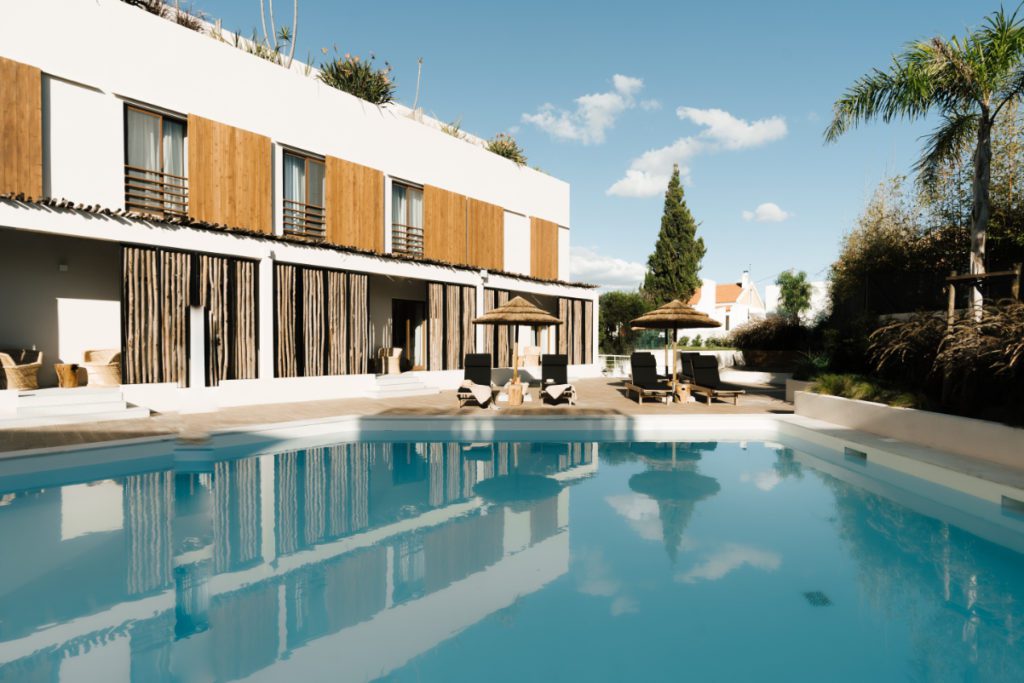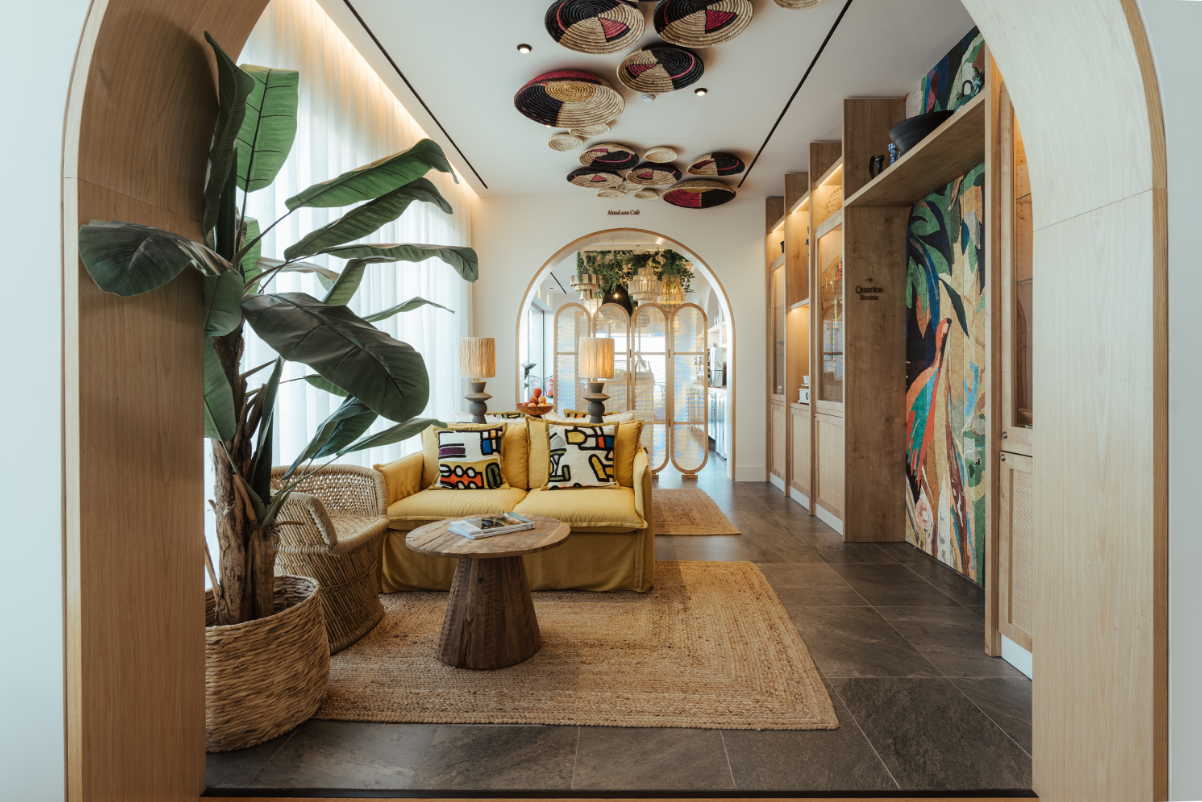Skift Take
The boutique brand AlmaLusa is betting that more tourists want to stay in places that deeply reflect Portuguese culture. It's testing whether luxury travelers care about authenticity rather than just location and amenities when picking hotels.
When international travelers visit Portugal, some may look for a big chain you’d find in, say Phoenix. But AlmaLusa, a boutique hotel brand founded in 2016, is banking on travelers looking for something more authentic.
“For the brand, the goal is to showcase Portuguese culture,” said Sofia Brandao, director of sales and marketing for AlmaLusa. That’s reflected in everything from the art on the walls to the items sold at their boutique. Even the water provided in the rooms is filtered and bottled by a local supplier.
So far, the formula seems to be working. The luxury boutique hotel brand has a 92 percent booking rate at their first hotel, the AlmaLusa Baixa/Chiado in the heart of Lisbon (located in a former arsenal), said Brandao.
It launched its newest hotel, in Comporta, late last year. Now it’s working on another hotel opening in Lisbon this summer. The AlmaLusa Sé, with 25 rooms, will be a couple of blocks from the AlmaLusa Baixa/Chiado property.
“It’s all about putting together something that could deliver a story,” Brandao said.
The Hamptons of Europe
Just over an hour south of Lisbon is the small fishing and farming village of Comporta, located on a long stretch of sandy beach, often named one of the most beautiful in Portugal. It has good local restaurants, white sand beaches, and surrounding rice patties.
It’s one of those places the locals all know but is only appearing on travelers’ maps now — with some publications referring to it as the “Hamptons of Europe” due to its similar coastal exclusivity.
The AlmaLusa Comporta, which opened in November, is the only hotel in the town itself. While other hotels say they’re in Comporta, they’re actually in nearby towns or on the outskirts, while AlmaLusa is central, with a 15-minute walk to the beach. Many of the other lodging options are villa rentals.
“Comporta is a village that dates back two centuries, and so we wanted to create a place that harmonized with the community and nature,” Brandao said. “The building had to have respect for the people who were there before us.”
AlmaLusa, like many boutique hotels right now, prides itself in its sustainability efforts — focusing on all the typical points of using less energy and avoiding plastic when possible. Yet the brand says it takes things further than just saving water.
“Sustainability for us is also about caring for the community,” said Brandao. “We give priority to partners who are local.”
That community support is reflected in things like training and hiring locals, promoting experiences led by local guides, and encouraging guests to try local dining options and not just stay on the property.
Encouraging guests to leave the property works from a community-supporting standpoint. Still, it may prove a bold move financially, as more real estate projects pop up in the area that likely won’t have the same mission.

Tourism Shift
It makes sense that highlighting Portuguese culture would be one of AlmaLusa’s main selling points. The name alone is a tip-off. Alma means “soul” in Portuguese, while Lusa is short for Lusitanians, which Brandao points out were one of the first inhabitants of the Iberian Peninsula.
“Every time we want to refer to our culture, we use the word ‘Lusa,’ and it distinguishes us from the Spanish,” said Brandao, because the Lusitanians were located more in what is now Portugal.
Back in 2012, AlmaLusa’s founder and CEO, Miguel Simões De Almeida, saw a lack in Portugal of small boutique hotels that had a uniqueness in service that would make the guest feel like a member, explained Brandao.
Before launching AlmaLusa, Simões De Almeida opened Aquapura, a luxury hotel and spa in the Douro River Valley, which Six Senses acquired in 2013.
“We’ve seen a big shift in travelers to Portugal wanting something between big chains and the smaller options with a lack of service,” said Brandao. With an emphasis on character-filled boutique hotels, and a goal of updated, inclusive service, AlmaLusa wants to be the hotel brand that fills that gap.
“We describe AlmaLusa as providing modern, intelligent luxury,” said Brandao. To them, that equates to free water, free wifi, and free use of mobile phones in the room to make local and international calls (well, a free 30 minutes of international calls per day, anyway).
While service is a priority — it’s considered a luxury brand, after all — the company’s staff strive to avoid coming across as stuffy, whether that’s in Comporta or Lisbon. Don’t expect to see any bellboys in suits.
“Our guests are wearing jeans, and they don’t want to walk into a place that feels so formal,” Brandao said.
Also, AlmaLusa is banking on another tourism trend Brandao has noticed in Portugal — more and more travelers doing self-drives around the country.
“Twenty years ago, it was unthinkable for travelers to visit a destination like Porto or Lisbon and then travel to another,” said Brandao.
If travelers continue to explore more “off the beaten path” locations on road trips, there’s much more potential for growth in Portugal. AlmaLusa has branched out with Comporta, and the question remains whether they can keep the momentum up and open more properties throughout the country that travelers are willing to visit.
Daily Lodging Report
Essential industry news for hospitality and lodging executives in North America and Asia-Pacific. Delivered daily to your inbox.
Have a confidential tip for Skift? Get in touch
Tags: boutique hotels, hotel development, independent hotels, lisbon, portugal
Photo credit: A reception area at the boutique hotel, AlmaLusa Comporta. AlmaLusa Comporta, which has a more beachside feel compared to its sister property, the AlmaLusa Baixa/Chiado in Lisbon. Source: AlmaLusa.
